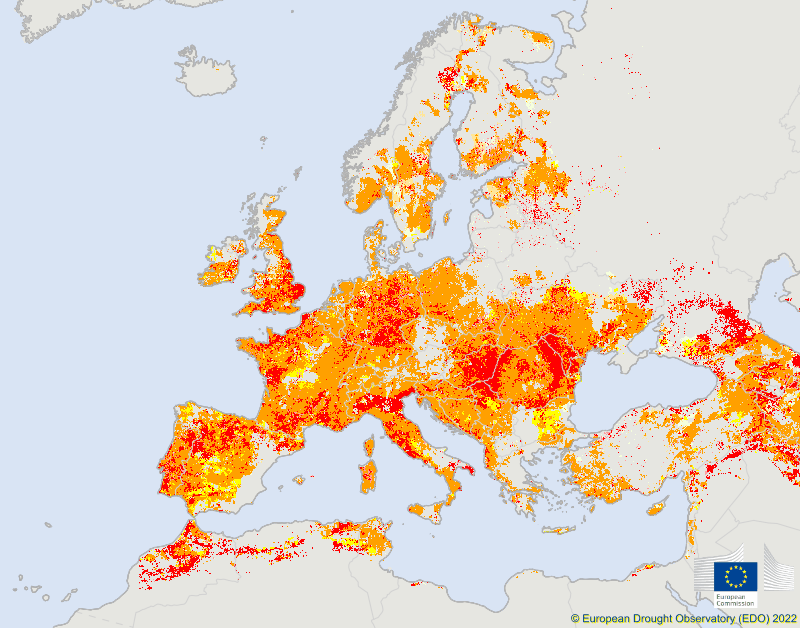Of all land in the European Union and the United Kingdom, 60% is under either drought warnings or alerts, according to the European Drought Observatory. In addition, Europe is bracing for another heatwave.
With water shortage and forest fires raging in the south, De Morgen makes an overview of which measures other countries are taking to protect citizens and nature.
1. the Netherlands
No additional measures are being taken in the Netherlands, which is remarkable considering how the country escalated its alert system from level one (impending water shortage) to level 2 (actual water shortage).
Minister of Infrastructure and Waterways Mark Harbers called for people to be more careful with how they use water. "I ask all Dutch people to think carefully about whether they need to wash their car or fill up their swimming pool."
Dutch water providers have a legal obligation to supply water and ensure there are sufficient levels of drinking water available. The country doesn't have any mandatory rules on water saving, although a regional body is responsible for water management.
Recently, the regional body in Brabant decided that residents cannot use water from ditches, brooks and rivers.
2. France
France is seeing serious drought measures being implemented across the country, prompting the government to declare a national crisis. A hundred small villages do not have safe drinking water and rely on bottled water and water deliveries.
In the south of France, nine municipalities have imposed a daily limit for water consumption, with officials inundated with calls from residents asking exactly what 200 litres of consumption looks like. Anyone who goes beyond the limit is fined €1,500.
France's agricultural sector has been hit particularly hard, with farmers warning of an imminent shortage of milk this winter.
Drought levels have not affected the country equally, as in the western part of France, the evaporation of seawater has resulted in a record harvest of sea salt.
3. Germany
In July, there was less than half the usual amount of rainfall. The rivers in Europe are low, which is all too clear in Germany. The waters of the river Rhine, important for ships, have sunk so low that ships may have to be transported via cargo, after a heat wave made the Rhine shrink to its lowest levels in 15 years.
The German shipping industry is dealing with high energy costs, supply issues and inflation. Long-term, Germany wants to deepen its rivers, but for now, inland vessels have to reduce their load so they can continue sailing.
4. Italy
Italy is battling its driest period in 70 years and large parts of the country have declared a state of emergency. Many are now rationing water. In Verona, drinking water can only be used for essential daily activities such as cooking.
Other cities have turned off their fountains, while washing cars and watering gardens is forbidden. Bologna advises people not to wash cars and to collect tap water for reuse. In a village near Bologna, the mayor prohibited barbers to wash clients' hair twice in an attempt to save water.
The drought led to an unusual discovery as a WWII bomb was discovered in the dried-up River Po. Military experts have since defused the 450-kilo bomb.
5. Spain
Spain is suffering the driest climate the country has experienced in 1,200 years, according to Nature Geoscience. In the regions of Galicia, Catalonia and Andalusia, the water reservoirs are at or below 40% of their of their capacity.
Many Spanish regions have now introduced water restrictions, which means a ban on watering gardens and washing cars.
Similar to France, Catalonia has limited personal water consumption in 150 municipalities to 200 litres per person per day. In Galicia, also ravaged by forest fires, municipalities are preparing to stop nightly water supplies.
6. the United Kingdom
The UK is known for its rain, but this year rain is hard to come by as large parts of the country are on the verge of drought after record-breaking temperatures. Only in northern Scotland is the rain still there. In the UK's south, there's a ban on using garden hoses in several cities.
Environment Minister George Eustice is calling on all water authorities in the country to take action.
7. Balkans
The whole region is plagued by heat waves this summer, which could pose threats to security. The World Climate and Security Report 2022 warns that the consequences of climate change, such as drought, heat waves and tropical storms, could escalate post-conflict tensions in the Balkans.
The agricultural sector is also impacted, affecting life in vulnerable areas of the area.

